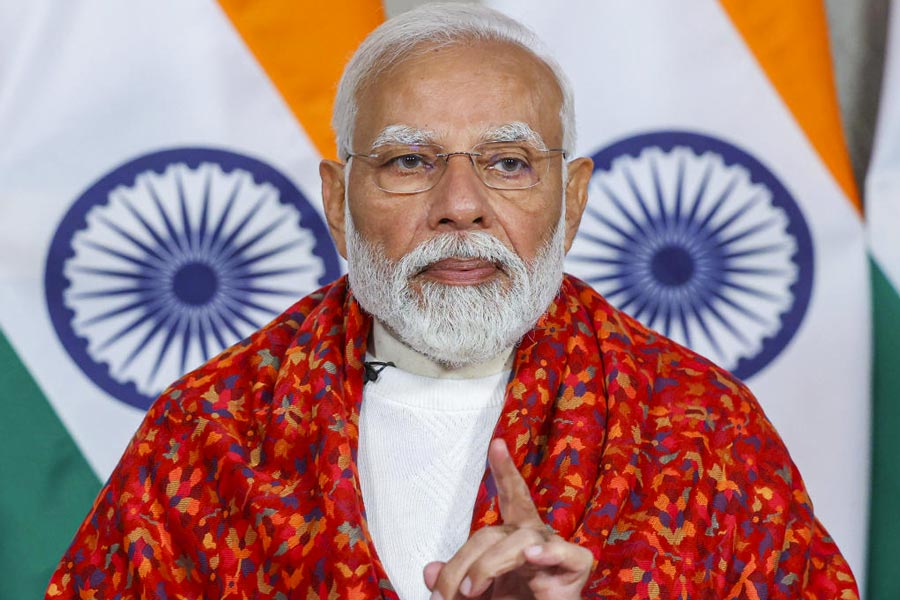Two days before Prime Minister Narendra Modi consecrates the Ram temple in Ayodhya, he invoked a Kazi Nazrul Islam song on Lord Ram.
“The people of West Bengal have immense reverence towards Prabhu Shri Ram. Here is the iconic Nazrul Geeti Mono Jopo Naam. #ShriRamBhajan,” Modi wrote on his X handle and shared a YouTube link of the Nazrulgeeti sung by Payel Kar.
The first stanza of the Bengali lyrics says: “Mono jopo naam/Shri Raghupati Ram, nava doorbadalshyam nayanaviram/Moo jopo naam/Shri Raghupati Ram. (My heart chants the name of Raghupati Ram/ His eye-catching look is pleasant like newly grown verdant grass).”
Born in Churulia, currently in West Burdwan district, in 1899, Nazrul had earned the moniker of “Bidrohi Kabi (rebel poet)” for poems against oppression. But as a representative of Bengal’s syncretic culture, the poet’s songs and poems include several Shyama Sangeet (in praise of Goddess Kali), bhajans and kirtans (celebrating Lord Krishna) as well as Islamic compositions.
Modi’s use of Nazrulgeeti is a conscious attempt to woo Bengal’s voters ahead of the Lok Sabha polls, said a BJP leader.
“Modi’s effort to connect Bengal with Nazrul is another form of reaching out to the people in the state where his party is not strong enough and wants to better its 2019 Lok Sabha performance of 18 seats,” the BJP leader said.
BJP leaders said the Prime Minister’s choice of a Nazrulgeeti was a conscious decision. They said Modi wanted to convey the message that a Muslim poet had written a song to celebrate Lord Ram but the Trinamul was trying to distract the people from the Ram temple event by organising interfaith rallies on January 22.
“Modiji stressed Bengal’s connection with Ram and picked a non-Hindu poet to showcase it. It sends a message that Lord Ram is not a stranger to the state but has always been worshipped,” said a state BJP leader.
“Mora eki brinte duti kusum Hindu-Musalman, Muslim tar nayan mani, Hindu tahar pran. (We are two flowers on one stalk, one is a Hindu and another is a Muslim/ While Muslim is the pupil of the eye, Hindu is the soul),” wrote Nazrul, also the national poet of Bangladesh.
Trinamul leaders, including Mamata Banerjee, often refer to the song to describe how amity is at the core of Bengal’s existence.
“If we can appreciate Mora eki brinte duti kusum Hindu-Musalman as a great work of Nazrul Islam, then what is the problem in acknowledging that the same poet was devoted to Ram?” asked Bengal BJP chief spokesperson Samik Bhattacharya.
Countering Modi’s effort to appropriate Nazrul, Trinamul Rajya Sabha MP Jawhar Sircar wrote on X: “...Nazrul has several invocations to Kali and other Hindu gods, goddesses — but these are expressions of his secular heart — not any support for narrow fundamentalists!”
"For me, this effort by the Prime Minister proves his desperation to connect with Bengal. I think he is very upset with Bengal. He worked a lot to find a song on Ram by Nazrul, which is rare...," said academic Pabitra Sarkar, adding that those who claimed Nazrul was a devotee of Ram should know that the poet was extremely poor and used to write songs for his "survival".
Somerita Mallik, a Nazrulgeeti singer and president of Chhayanat that is known for its research on Nazrul, said: "He didn't confine himself to composing only devotional songs for both Hindus and Muslims, he extensively wrote on freedom, love and revolution. He opposed all forms of bigotry...."











